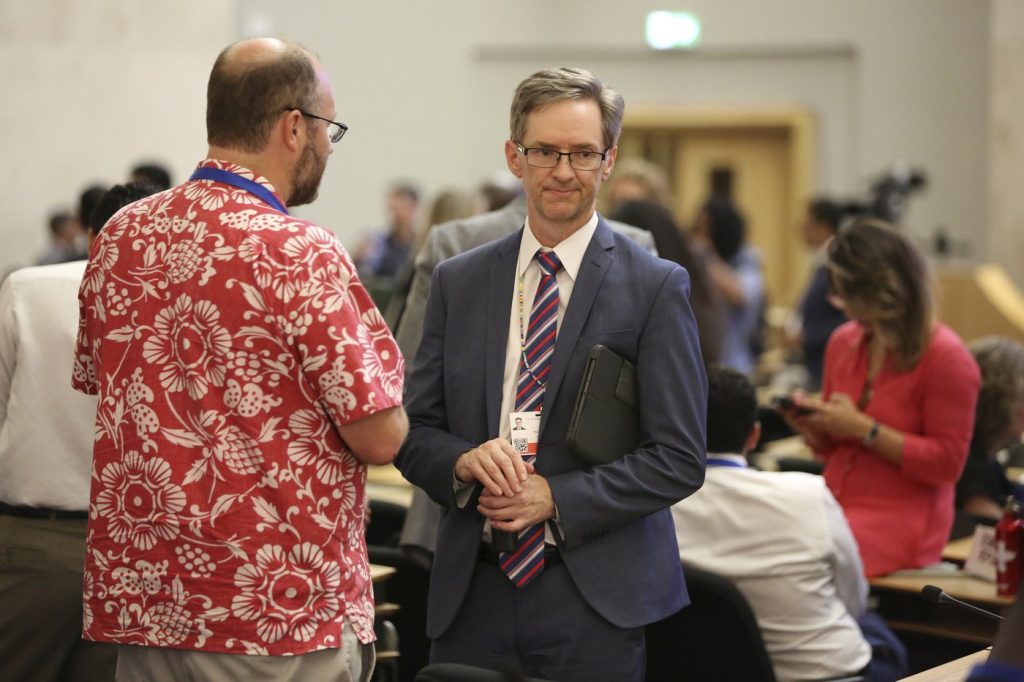GENEVA (AP) - Negotiations for a global treaty aimed at ending plastic pollution are set to conclude Friday, but participating nations are currently at an impasse regarding the issue of escalating plastic production. This decisive meeting follows a lengthy negotiation process where a new draft of the treaty was anticipated on Thursday, the final scheduled day of talks. However, the meeting for delegates was postponed multiple times, culminating in a session that lasted less than a minute before being adjourned by Luis Vayas Valdivieso, the chair of the negotiating committee.
Norway's Minister for Climate and the Environment, Andreas Bjelland Eriksen, expressed optimism about the extended negotiations, arguing that this indicates a possibility of progress. Many delegations, including Norway's, have criticized the draft treaty presented on Wednesday, claiming it lacks necessary ambition by not addressing limits on plastic production or the chemical substances utilized in plastic products. Instead, the draft focuses on areas where there is broad consensus, such as reducing problematic plastics that contribute to environmental pollution, promoting the redesign of plastic products for better recyclability, and improving waste management systems.
French President Emmanuel Macron condemned the current draft for its lack of ambition, stressing that a global treaty presents an opportunity to effect real change. He urged all nations in Geneva to adopt a treaty that meets the urgent environmental and health challenges posed by plastic pollution, emphasizing the necessity of prompt action for the sake of future generations.
The negotiations involve representatives from 184 countries and over 600 organizations, highlighting the global stakes of this treaty. Approximately 100 countries are advocating for limits on plastic production, along with emphasis on cleanup efforts and recycling measures. Strong opposition comes from oil and gas-producing nations and the plastics industry, who prefer a focus on waste management and methods of reuse. They argue that the current draft fails to define the treaty's parameters adequately.
Iraq's delegation head, Luay Almukhtar, stated that while Iraq is not in favor of reducing the production of polymers for making plastics due to potential negative economic consequences, they do support restrictions on certain chemical additives and the reduction of single-use plastics. This indicates a desire for a collaborative approach that balances environmental needs with economic realities.
Camila Zepeda, representing Mexico's Ministry of Environment and Natural Resources, expressed skepticism about achieving production limits at this stage but called for more extensive provisions regarding sustainable production and consumption in the treaty's wording. Mexico and Switzerland are prominently advocating for the inclusion of articles addressing problematic products, including single-use plastics and hazardous chemicals.
This marks the sixth round of negotiations and extends to the tenth day of discussions, reflecting ongoing tensions and disagreements that stalled progress in previous meetings held in South Korea. Attendees are eager to avoid another round of talks, with Fiji's permanent secretary for environment and climate change demanding a formal treaty that satisfies all parties involved. Conversely, Hiwot Hailu, chief of staff for Ethiopia's Environmental Protection Authority, indicated that continued dialogue could be necessary if agreement on key financing and lifecycle issues surrounding plastic is not reached.
European Commissioner for the Environment, Jessika Roswall, reinforced the importance of a treaty covering the full lifecycle of plastics, emphasizing that a weak and unyielding agreement would not serve anyone's interests. As negotiators head into the final day, the pressure mounts to develop a robust treaty amidst the complexities of competing national interests and environmental imperatives.












